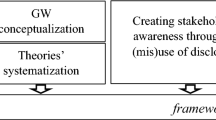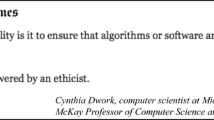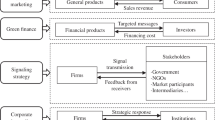This paper presents a model of quality choice in the case of credence goods, i.e., when consumers cannot observe quality even after purchase. It shows that firms may voluntarily overcomply, i.e., produce high quality, even when doing so implies giving up short-run profits. This generalizes results on reputation effects derived in the IO literature for the case of experience goods. The crucial assumptions of the model are that there is a positive degree of monitoring of firms’ claims and a positive probability that the firm is of an “honest type,” i.e., always prefers to produce high quality. The result also helps explain why we see phenomena such as firms voluntarily overcomplying with environmental standards, food safety laws, etc. It is shown that overcompliance is more likely when consumers learn about all (positive and negative) monitoring results than when consumers only find out about firms that have been found cheating, as is often the case in practice. I further show that even firms that pretend to be producing high quality while really producing low quality may have an incentive to lobby for stricter monitoring. This helps explain, for example, why firms in Europe and the United States lobby for the implementation of voluntary environmental audits, third-party labeling agencies or other disclosure strategies.
Similar content being viewed by others
References
J.F. Tomer, The human firm in the natural environment: a socio-economic analysis of its behavior, Ecol. Econ. 6 (1992) 119–138.
B. Smart, Beyond Compliance. A New Industry View of the Environment (World Resources Institute, Washington, DC, 1992).
Spiegel Special, Wege aus der Weltkrise. Oko-Bilanz ’95 (Spiegel-Verlag, Hamburg, Germany, February 1995).
Greenberg/Lake, New Priorities for Energy Policy, Polling Report (Washington, DC, February 8, 1993).
T. Tietenberg, Disclosure strategies for pollution control, Environ. Resour. Econ. 11(3–4) (1998) 587–602.
F. Allen, Reputation and product quality, RAND J. Econ. 15 (1984) 311–327.
B. Klein and K. Leffler, The role of market forces in assuring contractual performance, J. Polit. Econ. 81 (1981) 615–641.
C. Shapiro, Premiums for high quality products as rents to reputation, Q. J. Econ. 98 (1983) 659–680.
J. Tirole, The Theory of Industrial Organization (MIT Press, Cambridge, MA, 1988) pp. 125–126.
D. Kreps and R. Wilson, Reputation and imperfect information, J. Econ. Theory 27 (1982) 253–279.
P. Milgrom and J. Roberts, Predation, reputation, and entry deterrence, J. Econ. Theory 27 (1982) 280–312.
A. Wolinsky, Competition in markets for credence goods, J. Inst. Theor. Econ. 151(1) (1995) 117–131.
W. Emons, Credence goods and fraudulant experts, RAND J. Econ. 28(1) (1997) 107–119.
S. Arora and S. Gangopadhyay, Toward a Theoretical Model of Voluntary Overcompliance, Discussion Paper 94–11 (Resources for the Future, Washington, DC, 1994).
Author information
Authors and Affiliations
Corresponding author
Rights and permissions
About this article
Cite this article
Engel, S. Overcompliance, labeling, and lobbying: The case of credence goods. Environ Model Assess 11, 115–130 (2006). https://doi.org/10.1007/s10666-005-9030-6
Published:
Issue Date:
DOI: https://doi.org/10.1007/s10666-005-9030-6




